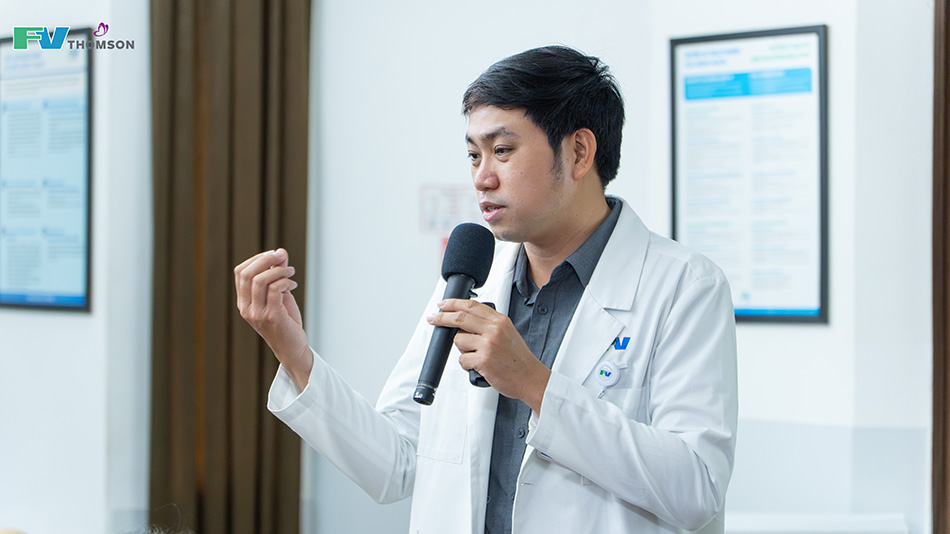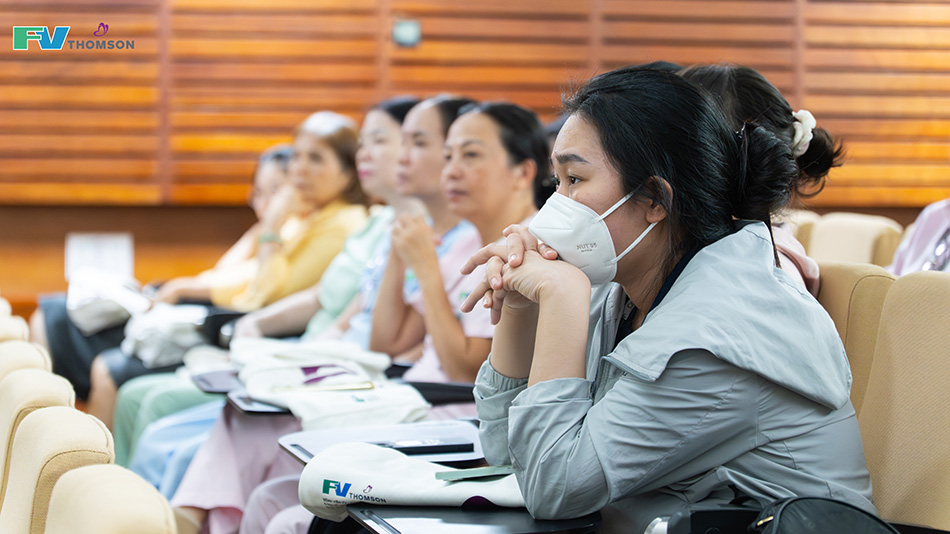On the afternoon of Monday, 7 July 2025, FV Hospital hosted a MEDTalks – Conversations with Doctors session titled “Chronic Subdural Hematoma Treatment with Arterial Embolisation.” The programme provided patients and their families with practical, up-to-date medical information about this advanced treatment method.
The talk was delivered by Dr Huynh Huu Danh, Specialist Level I in the Imaging & Interventional Radiology Department at FV Hospital, who has successfully treated numerous cases of chronic subdural haematoma (CSDH) using endovascular techniques. Drawing on years of experience in embolisation procedures for complex conditions, Dr Danh presented the topic in a practical, accessible way for patients.
Understanding Chronic Subdural Haematoma (CSDH)
Chronic subdural haematoma is the build-up of abnormal fluid or blood between the arachnoid and dura mater layers that surround the brain. It is a common condition, particularly in older adults, with an incidence of 1.7 to 20.6 cases per 100,000 people per year – a number expected to increase in the future. CSDH carries a significant risk of mortality, disability, and a high likelihood of recurrence after surgery. Key risk factors include advanced age, male gender, and the use of anticoagulant or antiplatelet medications.

Drawing on years of experience in treatment, Dr Huynh Huu Danh provided valuable insights into chronic subdural haematoma (CSDH).
Recent theories suggest that CSDH is characterised by repeated microbleeding and fluid leakage from inflammatory neomembranes, with the middle meningeal artery (MMA) playing a key role in supplying blood to these membranes.
A Breakthrough Treatment: Middle Meningeal Artery Embolisation (MMA Embolisation)
MMA embolisation is an innovative procedure increasingly used to treat chronic subdural haematoma, either alone or alongside surgical drainage. By blocking the MMA, this technique disrupts the cycle of microbleeding and inflammation by targeting the blood supply to the neomembranes involved in CSDH.
Key Advantages of MMA Embolisation:
- MMA embolisation directly targets the blood supply to the neomembranes, the main cause of CSDH.
- The procedure has been proven safe, with a low complication rate, and significantly reduces recurrence compared to surgery alone.
- Although haematoma resolution is slower, the long-term outcome is more sustainable.
- Patients do not need to discontinue anticoagulant or antiplatelet medications, which is a major advantage in many cases.
Basic Endovascular Procedure:
MMA embolisation is a vascular intervention performed through the bloodstream and carried out in a cath-lab using DSA (Digital Subtraction Angiography) technology. Interventional radiology specialists use microcatheters and guidewires, guided precisely through the vessels with the assistance of the DSA system.
Following the procedure, patients are monitored with scheduled CT scans at 1, 3, and 6 months to assess haematoma thickness, recurrence, and any midline shift. Results show that approximately 92% of CSDH cases are fully resolved after six months.
The risk of serious complications from MMA embolisation is extremely low. Minor side effects may include swelling, inflammation, or discomfort at the puncture site. Severe complications, such as stroke or vision loss are very rare and have only been reported in isolated cases.

The talk took place in a friendly, welcoming atmosphere and attracted many patients and FV staff who actively participated and engaged in discussions.
FV Hospital sincerely thanks all attendees for taking the time to join us and stay informed about health care. We look forward to more opportunities to share in-depth medical knowledge with the community through doctor-led talks that are approachable, accessible, and easy to understand.
For further consultation on endovascular treatment methods or to book an appointment with Dr Huynh Huu Danh, Specialist Level I, please contact the Imaging & Interventional Radiology Department at FV Hospital on (028) 3511 3333, Ext: 1642.
Information about upcoming Conversations with Doctors sessions will be shared on FV Hospital’s Facebook page – click here to follow and register!

 Vi
Vi 












